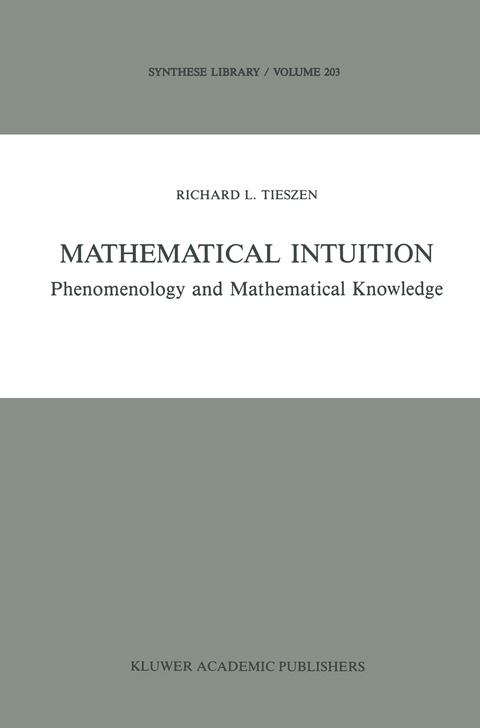
Mathematical Intuition
Springer (Verlag)
978-0-7923-0131-8 (ISBN)
"Intuition" has perhaps been the least understood and the most abused term in philosophy. It is often the term used when one has no plausible explanation for the source of a given belief or opinion. According to some sceptics, it is understood only in terms of what it is not, and it is not any of the better understood means for acquiring knowledge. In mathematics the term has also unfortunately been used in this way. Thus, intuition is sometimes portrayed as if it were the Third Eye, something only mathematical "mystics", like Ramanujan, possess. In mathematics the notion has also been used in a host of other senses: by "intuitive" one might mean informal, or non-rigourous, or visual, or holistic, or incomplete, or perhaps even convincing in spite of lack of proof. My aim in this book is to sweep all of this aside, to argue that there is a perfectly coherent, philosophically respectable notion of mathematical intuition according to which intuition is a condition necessary for mathemati cal knowledge. I shall argue that mathematical intuition is not any special or mysterious kind of faculty, and that it is possible to make progress in the philosophical analysis of this notion. This kind of undertaking has a precedent in the philosophy of Kant. While I shall be mostly developing ideas about intuition due to Edmund Husser! there will be a kind of Kantian argument underlying the entire book.
1. The Concept of Intuition in Mathematics.- 1. Introduction.- 2. Knowledge, Evidence, and Intuition.- 3. Intuition “of” and Intuition “that”.- 4. Some Recent Views of Mathematical Intuition.- 5. Hilbert and Bernays.- 6. Parsons.- 7. Brouwer.- 8. Some “Extended” Proof-Theoretic Views.- 9. Gödel on Sets.- 10. Platonism and Constructivism.- 11. Mathematical Truth and Mathematical Knowledge.- 12. Principal Objections to Mathematical Intuition.- 2. The Phenomenological View of Intuition.- 1. Introduction.- 2. Intentionality and Intuition.- 3. Intuition of Abstract Objects.- 4. Acts of Abstraction and Abstract Objects.- 5. Acts of Reflection.- 6. Types and Degrees of Evidence.- 7. Comparison with Kant.- 8. Intuition and the Theory of Meaning.- 3. Perception.- 1. Introduction.- 2. Sequences of Perceptual Acts.- 3. The Horizon of Perceptual Acts.- 4. The Possibilities of Perception.- 5. The “Determinable X” in Perception and Indexicals.- 6. Perceptual Evidence.- 7. Phenomenological Reduction and the Problem of Realism / Idealism.- 4. Mathematical Intuition.- 1. Introduction.- 2. Objections About Analogies Between Perceptual and Mathematical Intuition.- 3. Objections Based on Structuralism.- 4. Objections About Founding.- 5. A Logic Compatible With Mathematical Intuition and the Notion of Construction.- 6. Is Classical Mathematics to be Rejected?.- 5. Natural Numbers I.- 1. Introduction.- 2. The Concept of Number Cannot Be Explicitly Defined.- 3. The Origin of the Concept of Number.- 4. Intuition of Natural Numbers.- 5. Ordinals.- 6. Ordinals and Cardinals.- 7. Constructing Units and the Role of Reflection and Abstraction.- 8. Syntax and Representations of Numbers.- 6. Natural Numbers II.- 1. Introduction.- 2. 0 and 1.- 3. Numbers Formed by ArithmeticOperations.- 4. Small Numbers and Singular Statements About Them.- 5. Large Numbers and Mathematical Induction.- 6. The Possibilities of Intuition.- 7. Summary of the Argument for Large Numbers.- 8. Further Comments on Mathematical Induction.- 9. Intuition and Axioms of Elementary Number Theory.- 7. Finite sets.- 1. Introduction.- 2. A Theory of Finite Sets.- 3. The Origin of the Concept of Finite Set.- 4. Intuition of Finite Sets.- 5. Comparison with Gödel and Wang.- 6. Unit Sets, the Empty Set, and Mereology vs. Set Theory.- 7. Large Sets and a Hierarchy of Sets.- 8. Illusion in Set Theory.- 9. Concluding Remarks.- 8. Critical Reflections and Conclusion.- 1. Introduction.- 2. Summary of the Account.- 3. Areas for Further Work.- 4. Platonism, Constructivism, and Benacerraf’s Dilemma.- Notes.
| Erscheint lt. Verlag | 30.6.1989 |
|---|---|
| Reihe/Serie | Synthese Library ; 203 |
| Zusatzinfo | XVI, 210 p. |
| Verlagsort | Dordrecht |
| Sprache | englisch |
| Maße | 155 x 235 mm |
| Themenwelt | Geisteswissenschaften ► Philosophie ► Allgemeines / Lexika |
| Geisteswissenschaften ► Philosophie ► Logik | |
| ISBN-10 | 0-7923-0131-5 / 0792301315 |
| ISBN-13 | 978-0-7923-0131-8 / 9780792301318 |
| Zustand | Neuware |
| Haben Sie eine Frage zum Produkt? |
aus dem Bereich


